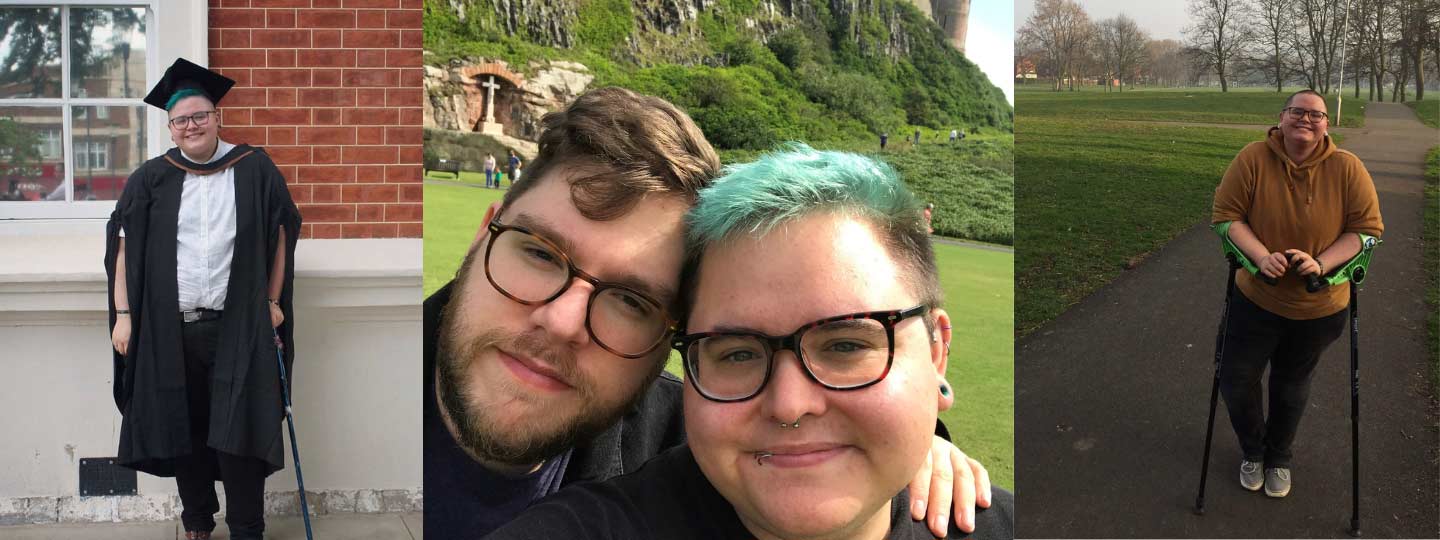“Fibromyalgia is not talked about enough.”
19 April 2021
Benji, 25, shares their experience of living with fibromyalgia and joint hypermobility syndrome. He tells us how he overcame internalised ableism and why a good support system is so important, especially in a society in which queer voices are often overlooked.
“I was glad to have a name for what was happening.”
It started with joint pain, mostly in my legs from my hips down. I’d had various joint pain issues growing up which were put down to growing pains. I was in year 7/8 when I started getting knee pain. The doctor said it was growing pains and because I was hypermobile and that I was hyperextending my knees too often because of the way I stood.
In 2015, I started getting leg pains again. I was getting tired a lot quicker than normal and never woke up refreshed, which I just put down to uni stress as I was in my first year and had a non-existent sleep schedule. I also had strange pains in my legs that felt like my shin bones were being crushed or frozen which was really confusing.
I was having to take more and more time off from uni because of bad pain days, so went to see my GP and they referred me onto the rheumatologist. I was diagnosed in 2016. I’d always known I was hypermobile, but I never knew that it could cause pain or that other people had issues with it too.
“Suddenly I found out how inaccessible the world was.”
The fibromyalgia diagnosis was a bit harder to take in because I knew there wasn’t as much understanding about it and that there was no cure. As someone who was not a cis woman, I felt it would be hard to find others with similar experiences and to feel included in conversations about it.
Fibromyalgia is not talked about enough, especially in terms of its impact on young people and people who aren’t cis women.
I’d already been living with chronic migraines for a couple years at this point but losing my mobility bit by bit was harder to come to terms with. Suddenly I found out how inaccessible the world was and felt even more the stigma young disabled people face.
I’d never had to use mobility aids before and felt a lot of shame and fear the first time I had to use my walking stick. There was a lot of internalised ableism I had to work through with the onset of my condition.
“A lot of my friends are also chronically ill so we’re all very close as we understand each other.”
Before the pandemic I had a small social life, there would be one or two social engagements a week that I could manage. Most of my social life is online but I do have some very understanding local friends who know I might have to cancel or rearrange things last minute.
Most of the time in person I’ll put on a brave face, unless it’s a friend who’s also disabled, because I don’t want to worry or concern people when I know they can’t really help. I’ll only share with others when I know they’d be able to help. I find it much easier to tell people how I feel when it’s not in person.
My fiancé Owain has been my absolute rock. He really stepped up when I got sick and has stayed by me as I’ve gotten worse and lost more mobility over the years. He helps me with day-to-day tasks, mostly in the kitchen.
He’s also been brilliant emotionally when I’ve had days where the pain just feels too much, or when a doctor hasn’t listened to me or taken me seriously. He just lets me cry it out, gives me hugs and cups of tea. He’s been a great advocate for me with doctors and social care.
“I miss not having to plan every single aspect of my day out.”
At the moment I can only work 12-15 hours a week because of my chronic fatigue. Working from home the past year has been really good for my pain management because I’ve been able to wear whatever I need to if my fibro is flaring, or I can lay on the sofa with my electric blanket and still work. My work is very flexible, so I’ve been able to work around pain flares.
I deeply miss days out in the summer to places like the zoo or a forest for a big walk. I miss going to Comic Con and walking around all day without getting too tired or having too much pain. I miss not having to plan every single aspect of my day out weeks ahead if I’m going to an event, for example.
Not knowing what my pain or fatigue is going to be like each day has made my anxiety bad because I’m always thinking about what might happen. Being in pain all the time definitely brings me down.
“It’s okay to ask for help”
My advice to others would be...
- find people who have the same or similar diagnosis, people who can understand what you’re going through.
- Be kind to yourself, let yourself take breaks when you need them and use whatever aids or adaptive technology you need.
- Don’t try and push through if a task is too much, it’s okay to ask for help.
If you identify as trans, non-binary, gender diverse or are gender questioning and need support, or, if you would like to learn more about how you can support someone visit: https://genderedintelligence.co.uk/
We’re here whenever you need us
- If you need advice or support, you can call our free helpline on 0800 5200 520
- Chat to our Arthritis Virtual Assistant
- Join our online community
- Stay in touch and follow us on Twitter, Facebook and Instagram.